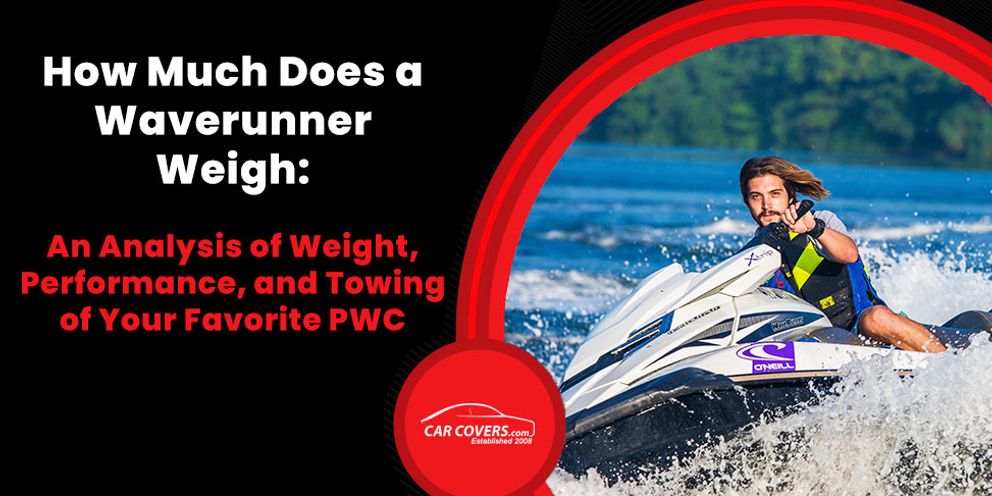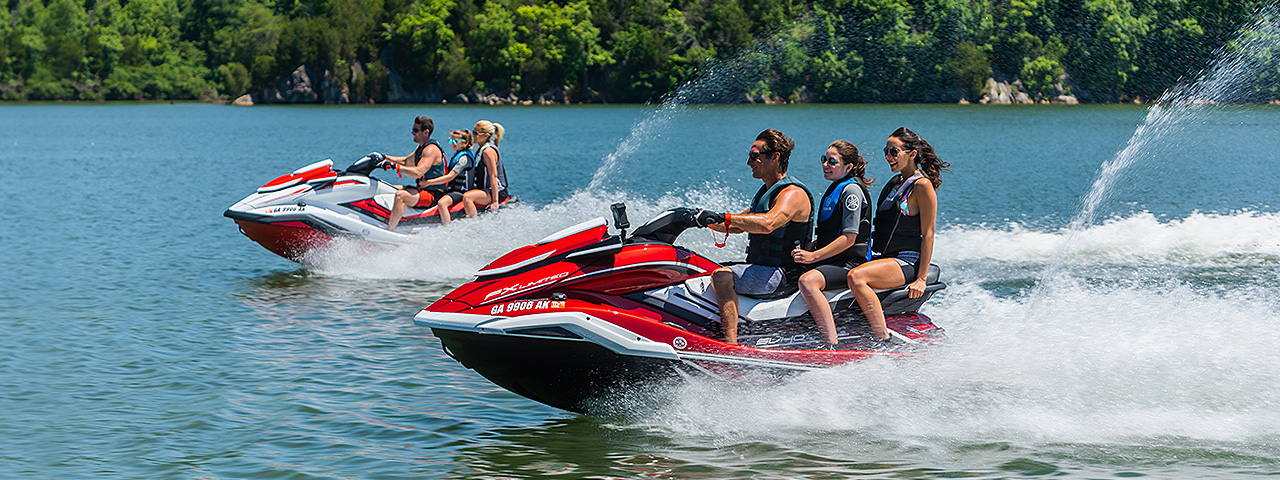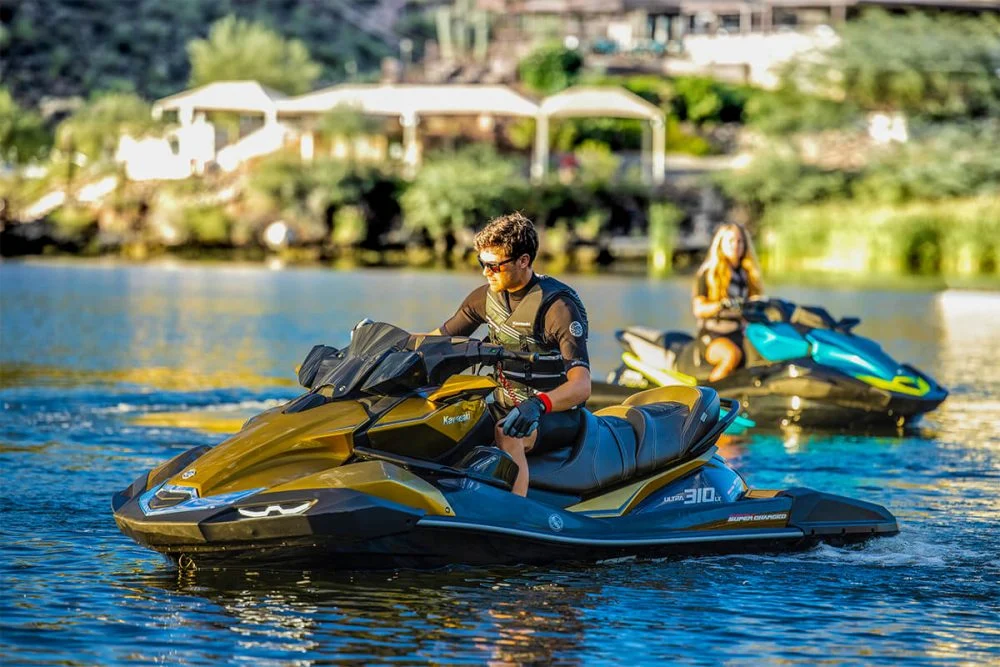
Discover How Much a WaveRunner Weighs: An In-depth Review
Discover How Much a WaveRunner Weighs: An In-depth Review
While buying a waverRunner, it is essential to consider how it looks, its engine power, and the size of the PWC. However, another important factor that you must not overlook is how much a waverunner weighs. The weight of personal watercraft is a major detail that many people fail to consider. The weight of your watercraft will determine whether your car or truck is big enough to tow it.
What is Meant When We Say "How Much Does a Jet Ski Weigh"
First-time buyers sometimes get the weight confused with the weight limit. Always pay attention to this as these are two completely different things. When inquiring about the weight of a jet ski, the question pertains to the specific measurement of the jet ski's mass or overall weight. It is not referring to the minimum weight requirement or any other weight-related limitations. The intention is simply to gather information about the actual weight of the jet ski, providing a numerical value that indicates its physical mass.
Many manufacturers nowadays highlight the weight of their models, making the decision easier for you. However, the weight of the gear and fuel should always be added to ensure an accurate estimate of the total PWC weight.
Why is It Important to Know the Weight of Your Jet Ski
Knowing the weight of a personal watercraft (PWC) is important for several reasons:
Safety: The weight of a PWC affects its stability and maneuverability in the water. Understanding the weight of the jet ski helps users determine the appropriate size and power of the PWC for their needs. Overloading a PWC beyond its weight capacity can lead to loss of control, instability, and potential accidents.
Towing and Trailering: If you plan to transport your PWC on a trailer, knowing its weight is crucial for selecting an appropriate trailer and ensuring you adhere to legal weight limits. Overloading a trailer can cause damage to the PWC, the trailer, or both, and may also pose a safety risk while towing.
Storage and Docking: When storing or docking a PWC, knowledge of its weight is essential to ensure that the dock or storage unit is sturdy enough to support the PWC's weight. Improperly supported PWCs can damage the structure or lead to accidents if they collapse or fall.
Fuel Efficiency and Performance: The weight of a PWC affects its fuel efficiency and performance on the water. Heavier PWCs generally require more fuel to operate and may have reduced acceleration and top speed compared to lighter models.
Legal and Regulatory Compliance: Many jurisdictions have specific regulations regarding the maximum weight of PWCs allowed on certain water bodies. Knowing the weight of your PWC ensures compliance with these regulations and prevents potential fines or penalties.
How Much Does a Jet Ski Trailer Weigh

Once you know the weight of your jet ski, the next step is to ensure that you get an appropriate trailer. When it comes to transporting your beloved jet ski, having a reliable and sturdy trailer is crucial. However, understanding the weight of a jet ski trailer is essential for proper towing and ensuring your vehicle can handle the load. The weight of a jet ski trailer can vary based on brand, model, material, size, and additional features.
Understanding Jet Ski Trailers:
Jet ski trailers are specially designed to transport personal watercraft safely and efficiently. They typically consist of a frame, axles, wheels, and a hitch for attaching to a towing vehicle. Several factors determine the weight of a jet skis trailer such as the material used, trailer size, and additional features.
Average Weight of Jet Ski Trailers:
The weight of jet ski trailers can vary significantly depending on their design and construction. On average, jet ski trailers can range from 150 pounds (68 kilograms) to 600 pounds (272 kilograms). However, it's important to note that these figures are approximations, and the actual weight may differ based on individual specifications.
Factors Influencing Jet Ski Trailer Weight:
Material:
Aluminum: Aluminum trailers tend to be lighter in weight, making them easier to tow. They also offer better resistance to corrosion.
Steel: Steel trailers are generally heavier but provide increased durability and strength.
Size and Capacity:
Larger trailers designed to carry multiple jet skis or larger watercraft will naturally weigh more due to their size and load-bearing capacity.
Additional Features:
Trailers equipped with extra features such as spare tire mounts may add weight but offer added convenience and functionality.
Considerations When Choosing a Jet Ski Trailer:
Towing Vehicle Capacity: Ensure your towing vehicle can safely handle the weight of both the jet ski and the trailer.
Storage and Maneuverability: Consider the trailer's size and any folding features if storage space is limited.
Budget: Depending on your needs and preferences, the weight and features of the trailer may influence the cost.
How Much Does a Single Jet Ski Trailer Weigh
The weight of a single jet ski trailer can vary depending on factors such as its size, construction materials, and additional features. On average, a single jet ski trailer typically weighs between 300 to 600 pounds (136 to 272 kilograms). However, it's important to note that trailer weights can differ significantly, ranging from lighter models designed for smaller jet skis to heavier trailers capable of carrying larger watercraft. To obtain an accurate weight, it's recommended to consult the manufacturer's specifications or refer to the documentation provided with the specific trailer model.
How Much Does a Double Jet Ski Trailer Weigh
On average, a double jet ski trailer typically weighs between 500 to 1,000 pounds (227 to 454 kilograms). To obtain accurate information about the weight of a double jet ski trailer, it is best to consult the manufacturer's specifications.
How Much Does a WaveRunner Weigh?

The weight of a Yamaha WaveRunner (commonly referred to as a "waverunner") can vary depending on the specific model and features. Here are the approximate weight ranges for popular Yamaha WaveRunner models:
Yamaha EX Series: The EX-Series is Yamaha's entry-level lineup of WaveRunners. These models typically weigh between 577 to 600 pounds (262 to 272 kilograms), depending on the specific model and accessories.
Yamaha VX Series: The VX Series offers mid-range performance and comfort. The weight of VX models generally falls within the range of 664 to 720 pounds (301 to 327 kilograms), depending on the specific model and features.
Yamaha FX Series: The FX Series represents Yamaha's high-performance and luxury models. These WaveRunners tend to be larger and heavier, with weights ranging from 820 to 855 pounds (372 to 388 kilograms), depending on the specific model and accessories.
How Much Does a Waverunner with a Trailer Weigh
The combined weight of a WaveRunner and a trailer will depend on the specific models of both the WaveRunner and the trailer.
On average, a single WaveRunner trailer typically weighs between 300 to 600 pounds (136 to 272 kilograms). As mentioned earlier, the weight of the WaveRunner itself can vary depending on the model, ranging from approximately 577 to 855 pounds (262 to 388 kilograms).
To determine the total weight of a WaveRunner and its trailer, you would need to add the weight of the WaveRunner to the weight of the trailer. For example, if we take the average weights mentioned above, the combined weight would range from around 877 to 1,455 pounds (398 to 660 kilograms).
Keep in mind that these figures are approximate and can vary depending on the specific models and additional features of the WaveRunner and trailer. It's always best to refer to the manufacturer's specifications or consult the documentation provided with the particular WaveRunner and trailer combination you are interested in for accurate weight information.
A Comparison of How Much Do a Sea Doo, WaveRunner, and Jet Ski Weigh
The weight of your jet ski varies depending on the manufacturer and the model. The three market leaders Sea-Doo, Yamaha, and Kawasaki make models of all weights and sizes. Furthermore, all three PWC manufacturing companies make jet skis with different specs, adjusted as per your budget.
- The Kawasaki Jet Ski's weight specs can vary between 551 and 1074 pounds.
- Sea-Doo jet skis weigh around 406 - 981 pounds and,
- Yamaha Waverunners come in the 336 - 964 pounds range.
Different Models of Jet Ski: How Much They Weigh, and How Do They Perform
The weight of personal watercraft is directly linked to its performance. The greater the engine and the bigger the hull, the heavier the watercraft is meant to be. Different models of PWC are categorized under different classifications. The major categories include Rec-Lite, Recreation, Luxury/Performance, and Stand Up.
The performance of luxury PWCs are the real deal. They can weigh up to 1100 lbs. and they are undoubtedly beasts in the water. However, the larger weight means that they require a great deal of upkeep and bigger storage space.
The stand-ups are the most basic kind and are the lightest in weight. They have a rider capacity of only one person and it requires a certain level of athletic skill to be ridden safely as they are relatively easy to handle out in the waters. The Yamaha Superjet is a really popular stand-up watercraft on the market. It weighs around 300 pounds and is also one of the smallest available PWCs.
The rec-lite or the recreation is the most affordable model. These can be expected to weigh between 400-700 pounds and are relatively light in weight as well. The Sea-Doo Spark series features the lightest-weight sit-down models.
How Much Does the Heaviest Jet Ski Weighs

Typically, a jet ski weighs between 400 pounds and 1,200 pounds. Currently, the lightest jet ski on the market is the Sea-Doo Spark, weighing in at 405 lbs. / 184 kgs. The heaviest jet ski is the Kawasaki Ultra 310 LX with a weight of 1,074 lbs. / 487 kgs.
How Much Does a WaveRunner Weighs: Comparison of Price of Yamaha, Sea-Doo Krash, and Kawasaki
According to the weight range, the following is given a list of all popular jet ski models.
Brand
Model
Net Weight
Krash
All models (stand-up)
270-320
Yamaha
SUPERJET (stand up)
306
Sea-Doo
Spark series
400-500
Kawasaki
SX-R (stand up)
503
Yamaha
EXR, EX series
500-600
Sea-Doo
GTI series, GTX 170, Wake 170
600-800
Yamaha
VX series, GP1800R
600-800
Sea-Doo
RXT, RXP, GTX, GTR series
800-900
Sea-Doo
Fish Pro, Wake Pro 230
800-900
Yamaha
FX series
800-900
Kawasaki
Ultra 310 series
900-950
Sea-Doo
RXT, RXP, GTX, GTR series
800-900
How much does your jet ski weigh and the weight of the trailer collectively determine the overall safety, storage, and performance of your PWC. The weight of a jet ski and its trailer can vary depending on the specific models, features, and additional equipment.
Considering the weight of a personal watercraft (PWC) is important for several reasons. First of all, comes the safety of your PWC. Understanding the weight helps users select an appropriate PWC size and power that suits their needs. Overloading a PWC beyond its weight capacity can compromise safety, leading to loss of control and accidents. Secondly, the weight of your jet ski and the trailer determines its towing and trailering properties. It will help you select an appropriate tow vehicle and trailer. Overloading a trailer can cause damage to the PWC, the trailer, or even the tow vehicle. It is essential to adhere to legal weight limits, ensuring safe and secure transportation.
Thirdly, it is essential to properly store and dock your personal watercraft. Knowing the proper weight ensures that the dock or storage unit can handle the PWC's weight, preventing structural damage or accidents caused by improper support. Once you have docked and stored your PWC, it is recommended to cover it with a jet ski cover made for your exact make and model.
Considering the weight of a jet ski and its trailer is essential for safe operation, proper trailering, storage considerations, performance expectations, and adherence to legal requirements. It allows you to make informed decisions and ensures a positive and secure experience while enjoying your personal watercraft.
Updated